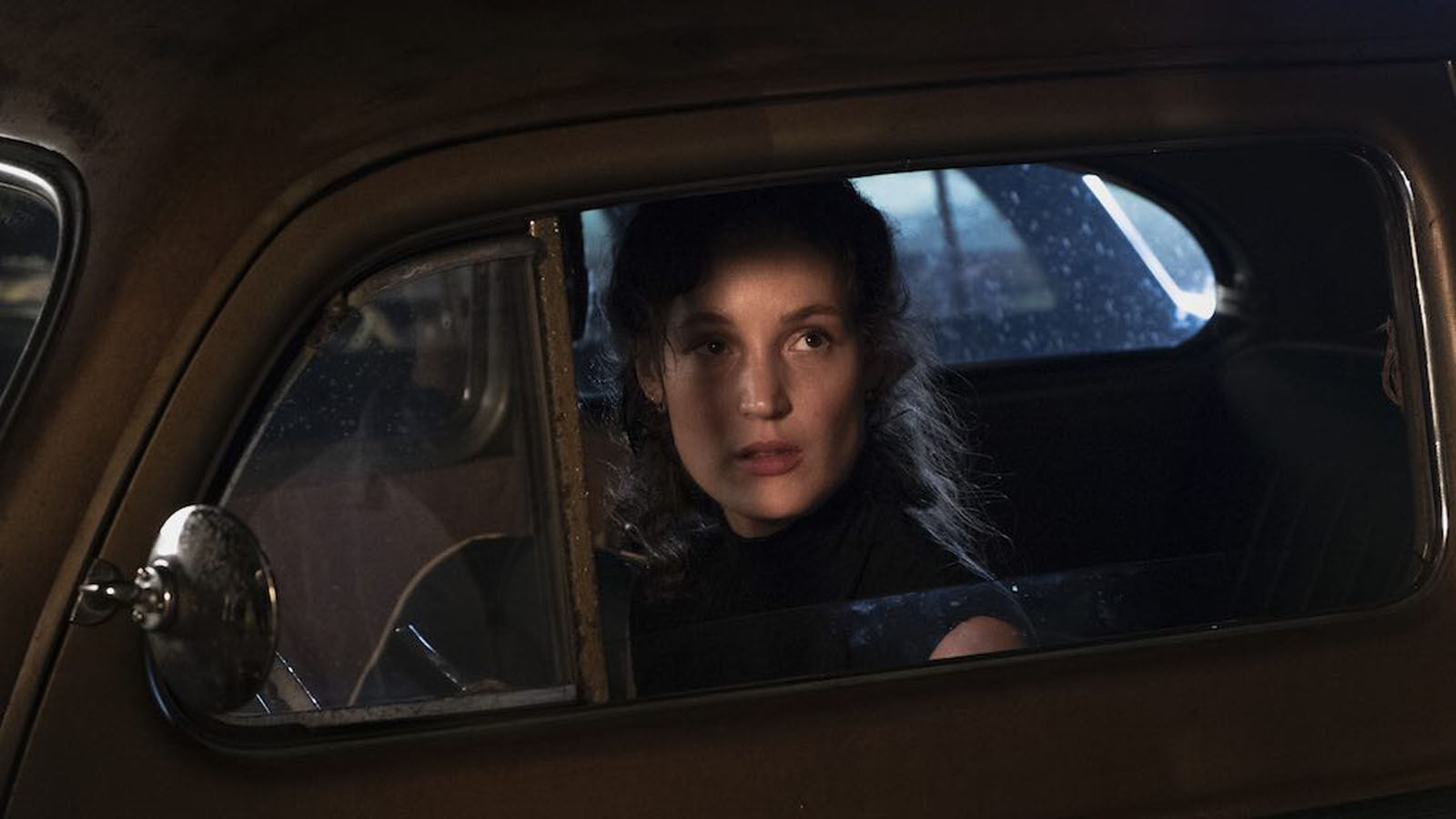
Very early in the morning, when the watery light of dawn has yet to fully drench the day, a woman absconds from her home while her husband and two children are still asleep in bed. Or does she? “I’m not the one who left,” she later claims. “I made it up. That way, you’re here.” The sixth feature film directed by acclaimed actor Mathieu Amalric, Hold Me Tight explores the fog of memory and loss through one woman’s attempts to come to terms with what really is and what can never be.
Absent Without Leave
Clarisse (Vicky Krieps) is in a state of emotional agony when she flees her home, leaving her family behind: her husband, Marc (Arieh Worthalter), her daughter, Lucie (Anne-Sophie Bowen-Chatet), and her son, Paul (Sacha Ardilly). The film juxtaposes Clarisse’s journey — driving, interacting with strangers, getting a new job, trying to start a new life — with Marc raising their children on his own as they all wonder if and when they will ever see Clarisse again.

Yet despite the physical distance between them, Clarisse’s emotional connection to her family is too strong to be truly broken. She narrates their daily activities as though she were there, encouraging piano prodigy Lucie to expand her repertoire beyond endless scales and advising Marc on how to best teach the kids to make pancakes. Indeed, Clarisse almost seems to be hovering in the air around them like a friendly ghost, influencing their actions and even conversing with them despite being physically absent. She scribbles notes in an orange journal that also appears in Lucie’s possession, as though mother is dictating her daughter’s diary from afar — as though Clarisse is the author of her family’s futures. “You should come up with a story we can tell,” Lucie says. “That’s what I’m doing, honey,” Clarisse replies.
Suspended in Gaffa
Adapted by Amalric from a play by Claudine Galea, Hold Me Tight’s heartbreaking twist—which occurs quite early, at the end of the film’s first act—reveals why Clarisse cannot be with her family and why she is so preoccupied with them living their best lives without her. And while it may seem strange to have such a big reveal occur so early in the film, in the context of the film, it actually makes sense, for it allows us to become closer to Clarisse and understand what is motivating her actions, which otherwise often seem inexplicable and borderline unhinged.

During the first part of Hold Me Tight, it can be hard for the audience to understand what is actually happening and what is a figment of Clarisse’s vivid imagination. In the latter parts of the film, we are all too aware, and that is what makes it so devastating. If the mystery had dragged on, perhaps the eventual reveal would be more of a gut punch, but instead, Amalric delivers a slow, painful squeeze to the heart that lingers with the audience and gives us more time to reflect on what is essentially the ultimate in what if? scenarios. François Gédigier’s hallucinatory editing doesn’t merely cut between the various versions of reality that are tumbling through Clarisse’s mind but layers and meshes them to create a vibrant college of lives lived and futures lost. Some scenes do drag, especially in light of us knowing what we do about them, but those are balanced by some that you wish could go on forever.
In Phantom Thread, Bergman Island, and yes, even M. Night Shymalan’s Old, Vicky Krieps has shown herself to be one of the most interesting and emotionally vulnerable screen actors working today. In Hold Me Tight, she delivers what may be her best performance yet, a raw, riveting portrayal of one woman’s emotional upheaval and the ways she tries to reconcile herself with it — including berating herself for her idealized memories of her family, noting that when they were together, the kids were often annoying and Marc was often like “a piece of furniture.” Yet despite her awareness of her own mind’s impracticalities, she cannot stop concocting these beautiful visions and using them as a shield to protect herself from the truth. After all, she seems to be telling herself, isn’t it better for our loved ones to have a future without us than no future at all? And while Arieh Worthalter’s performance is the less showy of the two adult leads, he is a perfect match for Krieps onscreen, with his earthy presence bringing out her sensuality and grounding their relationship in a real, recognizable place of longing.

Playing off of Lucie’s dream of becoming a famous pianist when she grows up, the soundtrack to Hold Me Tight features dazzling piano pieces — sometimes elegant, sometimes bombastic, always moving — from composers such as Ravel, Debussy, Messiaen, Beethoven, Rameau, Schönberg and Rachmaninov. Legendary pianist Martha Argerich also appears in archival footage, her inimitable presence igniting Clarisse’s hopes for her daughter and inspiring teenage Lucie to imitate her style (even dying her hair grey). The way the music is used only adds to the feeling that Hold Me Tight is less a narrative film than an elegaic collage of moments and feelings assembled by Amalric and his collaborators.
Conclusion
Thriving upon Amalric‘s sophisticated storytelling and Krieps‘ propulsive performance, Hold Me Tight may be too formally ambitious for some, but I found it incredibly effective and ultimately very moving.
What do you think? What is Vicky Krieps’ greatest performance to date? Share your thoughts in the comments below.
Hold Me Tight opens September 9 in New York at Film at Lincoln Center and Angelika Film Center and September 16 in Los Angeles at Laemmle Royal.
Watch Hold Me Tight
Does content like this matter to you?
Become a Member and support film journalism. Unlock access to all of Film Inquiry`s great articles. Join a community of like-minded readers who are passionate about cinema – get access to our private members Network, give back to independent filmmakers, and more.
Join now!




